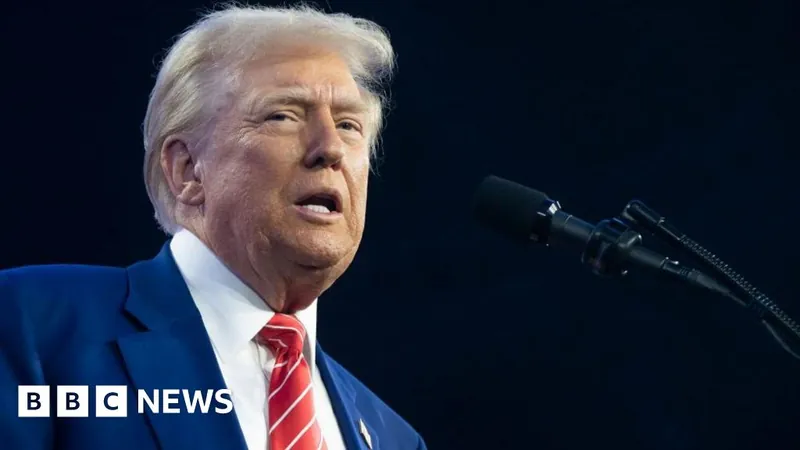
Hull Extends an Invitation to Donald Trump Amid Controversial Wind Farm Critique
2025-01-04
Author: Lok
In a surprising move, Hull has officially invited former US President Donald Trump to visit the area and witness firsthand the transformative impact of renewable energy, particularly offshore wind farms, on the local economy. This invitation comes on the heels of Trump’s scathing criticism of the UK’s pivot away from traditional oil and gas production, a topic he passionately aired on social media.
Trump’s remarks ignited debates when he called on the UK government to open up the North Sea for oil and gas extraction, describing wind farms as unsightly, and referred to them as "windmills." His comments followed an October announcement from the UK Chancellor to raise the tax on oil and gas companies, with the government increasing the tax rate on North Sea drilling from 35% to 38%.
Dave Laister, director of Humber Marine and Renewables, fervently defended the offshore wind industry, stating it has not only revitalized the maritime economy but also created hundreds of jobs across the Humber region. He extended his invitation to Trump, expressing a desire for him to engage directly with industry leaders to understand the significance of offshore wind for Hull, and how it aligns with global shifts towards sustainable energy.
Lincolnshire MP Richard Tice echoed Trump’s sentiments, branding the expansion of wind energy as a “catastrophe” and questioning its economic viability. Trump has also warned that Britain is “making a very big mistake” with its current energy strategy, particularly highlighting rising energy costs.
Despite criticism from some political figures, the Department for Energy Security and Net Zero (DESNZ) reassured the public that gas production in the North Sea is expected to continue for decades, emphasizing their commitment to a responsible transition towards renewable energy.
While Doug Parr, chief scientist at Greenpeace, pointed out that renewable energy sources are becoming substantially cheaper than fossil fuels, critics like Tice argue that a surge in wind farms corresponds with rising electricity bills in the UK. He challenged the government to explain why the UK has higher energy costs compared to the US, attributing the disparity to America’s extensive use of domestic gas.
Colin Davie, a councillor in Lincolnshire, expressed support for offshore turbines but acknowledged Trump’s valid concerns regarding the UK’s energy policy. He advocated for a balanced approach, combining oil and gas usage in the short term while transitioning to nuclear energy for a carbon-neutral future.
In a report, energy correspondents indicated that the growing reliance on wind energy is helping to keep UK electricity sources diversified, with wind accounting for a significant portion of the country's energy supply. In fact, renewable energy sources contributed to nearly 29% of the UK's power generation in 2024.
In a world where energy policies are scrutinized and debated, the Hull invitation to Trump reflects a broader dialogue about the future of energy, sustainability, and economic opportunity in the UK. As the country navigates its transition toward cleaner energy, the implications of these policies will undoubtedly shape the landscape of both economic and environmental strategies in the years to come.




 Brasil (PT)
Brasil (PT)
 Canada (EN)
Canada (EN)
 Chile (ES)
Chile (ES)
 Česko (CS)
Česko (CS)
 대한민국 (KO)
대한민국 (KO)
 España (ES)
España (ES)
 France (FR)
France (FR)
 Hong Kong (EN)
Hong Kong (EN)
 Italia (IT)
Italia (IT)
 日本 (JA)
日本 (JA)
 Magyarország (HU)
Magyarország (HU)
 Norge (NO)
Norge (NO)
 Polska (PL)
Polska (PL)
 Schweiz (DE)
Schweiz (DE)
 Singapore (EN)
Singapore (EN)
 Sverige (SV)
Sverige (SV)
 Suomi (FI)
Suomi (FI)
 Türkiye (TR)
Türkiye (TR)
 الإمارات العربية المتحدة (AR)
الإمارات العربية المتحدة (AR)